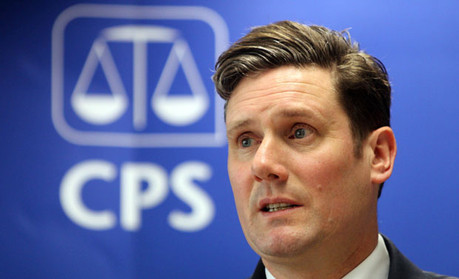
Keir Starmer calls for news outlets to feed back on 'whether they think these guidelines are workable and roughly get the balance right'
Credit: by Lewis Whyld/PA Archive/Press Association ImagesDirector of public prosecutions Keir Starmer has called on media outlets to respond to a consultation over interim guidelines for prosecutors on cases involving journalists and how to consider any public interest.
The guidelines, published in April, offer "clear advice to prosecutors who have been asked either for a charging decision or for early advice to the police or other investigators in these sensitive and difficult cases".
Advice includes what prosecutors need to establish from the start in terms of rights, as well as five examples of "conduct which is capable of serving the public interest", including the disclosure of a criminal offence or that there has been a miscarriage of justice.
Speaking to Journalism.co.uk today, Starmer said the guidelines were prompted by his evidence to the Leveson inquiry and by the "unprecedented situation" in light of the "number of cases involving journalists" being considered.
"Although in the past it's been quite rare for us to have to consider prosecuting journalists, we're facing a different situation now. Currently we've got 50 individuals on bail in relation to the various investigations that the Metropolitan police are carrying out and sooner or later decisions will have to be made in most if not all of those cases.
"So we find ourselves in an unprecedented situation of having to consider quite a number of cases involving journalists or those that have been working with them in some capacity."
He added that the Crown Prosecution Service is "very, very keen to have responses" to the consultation, which closes on 10 July.
"Amongst your readership will be people that may find these of great interest to the way that they work and the way they operate. To us it will be invaluable to have, from them, their views on whether they think these guidelines are workable and roughly get the balance right."
He added that the guidelines have been structured so as to indicate specific consultation questions around "critical issues" as well as a general question at the end calling for any other issues to be raised.
"This is something for anybody who engages in freedom of expression or imparting information and that's really important.
"It applies to social media, to online reporting, and one of the things we have not done in the guidelines is to define journalists, because that's not easy to define and we didn't want to run into problems of definition.
"This is going to apply to anybody really who is writing or commenting in whatever form."
In reference to the public interest factor, he added that there is not a "clear and consistent public interest defence" across all offences journalists "can conceivably commit" in the course of their work.
While he said the guidelines are not there to introduce a defence in these cases, they do aim to "make clear that the public interest is a relevant factor when we're taking a decision whether to prosecute or not".
And this is "a good thing", he added, "because otherwise we'd have to prosecute each and every case whatever the merits in terms of public interest."
Looking ahead he added that the guidelines will help to provide news outlets with the tools to make effective decisions in the future.
"Once people appreciate where the line is between prosecuting and not prosecuting, I hope and I think that people will try to regulate their own working practices to make sure they're the right side of the line.
"So on the one hand it's guidelines about how we all make individual decisions, but I think it will feed in to the general context of how should the media operate in a modern environment which is of course the big discussion going on at the Leveson inquiry."
Free daily newsletter
If you like our news and feature articles, you can sign up to receive our free daily (Mon-Fri) email newsletter (mobile friendly).
Related articles
- The first UK local news publisher gains charitable status
- How AI can help journalists track MPs financial interests
- How the Financial Times is broadening its portfolio
- 'Collaboration over competition' is the way forward for public interest media
- Three steps to protect newsrooms from press freedom attacks









